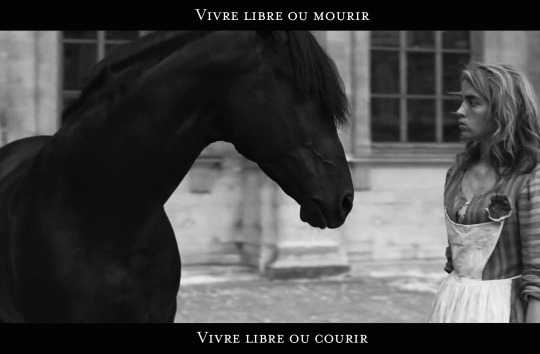#hélöise x marianne
Explore tagged Tumblr posts
Text










PORTRAIT OF A LADY ON FlRE (2019)
directed by Céline Sciamma
#poalof#poalofedit#céline sciamma#hélöise x marianne#adèle haenel#noémie merlant#wlw#wlw romance#wlw love#sapphic#sapphic romance#sapphic love#sapphics#lesbian#wlwsource#lgbt#lgbtq#lgbtqia#lgbtqia+#lgbtedit#dailylgbtq#filmedit#filmandtv#dailyfilmtvgifs#dailytvfilmgifs#tvfilmdaily#dailytvwomen#cinemapix#women filmmakers#userstream
180 notes
·
View notes
Text

📷: obviously from Le peuple et son Roi (2018)
Now posted on AO3
I haven’t really decided on when to post this on AO3 cuz the commitment would be significant, and involve many chapters, but this was a response to a half-jokey prompt from @nightshade2412 for an 18th-Century fanfic on Marianne x Hélöise. But I will at some point.
To be honest, the thing that bothered me the most about the two final Parisian codas in Portrait of a Lady on Fire was my own impending sense of dread for the times that the two principal characters will soon find themselves in.
Those scenes suggest a scant few years before the collapse of the ancien régime. What would of course follow was the upending of the social order and the age of terrible euphemisms: the Committee of Public Safety, the National Convention, the Directorate, the Consulate…
A period full of hypocritical oaths on equality and the rights of the (female) citizen, this time and place would probably not be the best time to resume a love affair between equals, but it is the world that Marianne and Hélöise were put in.
The good news is that Marianne could not see past the moment she was narrating in the film, and in this fic they meet a third, a fourth, a fifth, and a whole bunch of other times. The bad news is that it happens sometime between Year One of Equality (1792), The Terror, and The White Terror (1793-1795). At some point during these very bloody events, the hard-won attempts at enfranchisement by women in the early days of the Revolution are betrayed by both radicals and moderates in government.
The perception of time figures prominently in this telling. The First French Republic rejected the Gregorian calendar in favor of a radical, secular calendar to signify man’s triumph over the feudal past—and the start of a collective, egalitarian memory.
————
Vivre libre ou courir
...she had regained what I thought she had lost forever, the magical sadness which had drawn me to her, the thwarted look that had seemed to say, "Surely I was made for some other purpose than this?”
—Evelyn Waugh, Brideshead Revisited
Notes:
August 1, 1794.
It is five years after the French Revolution and nearly two years into the new Republic. The king and queen are dead. Robespierre is dead. The Terror is over but the “women’s clubs” that it outlawed remain shuttered. The price of bread is beginning to stabilize.
Marianne has found accommodation in this new order and is still gainfully employed as a painter, largely by being politically flexible with the leaders of competing factions in the National Convention.
Work is work. She still takes on a small number of pupils and works out of an atelier on rue du Chaume (now the rue des Archives), in what was the aristocratic Marais. The neighborhood is going through what we would now call a bit of transition.
Prologue: The Kalends of August
Year II of the French Republic, the 14th day of Thermidor, Quartidi.
————
Marianne couldn’t recall if it was a Thursday or a Friday in the old calendar. She’d kept a perpetual one in the studio but had stopped moving it forward in the weeks following the execution of Citizen Louis Capet.
That seemed a long time ago now.
Her attachment to the old method of marking the days was less about any kind of sentimentality. She was sentimental for sure, and at once still committed to whatever methods of measuring time, distances or weights were to govern this new world.
For the most part, this novel way of telling time celebrated both nature and reason, and she’d convinced herself that that was logic enough for her. But Marianne had become lousy at keeping time in general, and the ten (or was it eleven) months of this new system she’d endured so far—with its rhyming, excessively florid names and ten-day weeks—had tried her patience.
She was back to using their former names, and it was a hot day in August by any reckoning. She wasn’t about to venture outside to ask her friend the book-binder for one of his smuggled calendars from England or America. There will be time enough for that.
The pressing concern now was to find a way to keep all the sweet butter that Hélöise brought with her from spoiling. Even in the coolest place in the house, the oil in the pot had begun to separate, and it wasn’t even eight in the morning. Its faint odor conflated with the smells of the suppurating cheese in another cupboard and the vapors from the many paints and solvents in the atelier.
Indeed, the whole floor and even the attic above was in thrall to an alien miasma. Not that it mattered to Hélöise. She was sound asleep in their bed, unperturbed by Marianne puttering about, and remarkably unaffected by either the noise or by the rising heat.
Until she wasn’t.
“What is with all the noise?”
“I’m trying to summon something, like breakfast.”
“Does it usually involve all this slamming and moving about?”
“Well, yes.”
“Adagio. E domattina, please?”
“A Dio piacendo.” God willing.
“What does Robespierre call Him, the Supreme Being?”
“Did call Him. Did. My sweet.”
“Oh. How could i forget.”
It seemed rather strange then that the violence and dislocations of the last few months would find the two of them in a state of domestic quiet—more or less.
They had even settled on a kind of routine. Which was all the more extraordinary when you consider that they had both witnessed—but at some remove—the beheading of four of the most powerful men in the country, the mayor of Paris, and what remained of their camp-followers on the Place Louis XV not five days before.
The city was again on a knife’s edge, and the menfolk and quite a few market women were again engaged in their favorite pastime of settling political and personal scores, in a sanguinary manner, and often.
Hélöise had arrived the night before in her trousers and a striped purple coat. Not that there were many sans-culottes around anymore. Marianne advised her footman to remove the cockade from Heloise’s apron, all the better to blend in with the roving bands that radiated out of the Place des Vosges from the east, and the Hôtel de Ville to the west, that had been hunting Jacobin supporters for days now.
She bellows a yawn that Marianne can hear clear across the room.
“A noviciate at the convent, Marie-Fabienne, once told me a story.”
“Oh?”
“She liked me a lot. Quite a lot.”
“Am I going to like this story?”
“Come here and you’ll soon find out.”
————
[To be continued] (x)
#fanfic#portrait de la jeune fille en feu#portrait of a lady on fire#marianne x heloise#noemie merlant#adele haenel#celine sciamma
21 notes
·
View notes